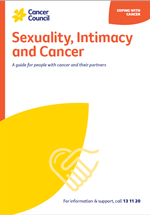- Home
- About Cancer
- Managing side effects
- Fertility and cancer
- Reproduction and fertility
Reproduction and fertility
Reproduction is the way we produce babies. Knowing how your body works may help you understand how fertility problems happen.
Learn more about:
- How reproduction works
- Factors that affect fertility
- The female reproductive system
- The male reproductive system
How reproduction works
The female and male reproductive systems work together to make a baby. The process involves combining an egg (ovum) from a female and a sperm from a male. This is called fertilisation.
Role of hormones
These substances are produced naturally in the body. Hormones control many body functions, including how you grow, develop and reproduce. The pituitary gland in the brain releases hormones that tell the ovary and adrenal gland to make sex hormones.
- Oestrogen and progesterone, often called female sex hormones, are produced in the ovaries. These hormones control the growth and release of eggs, and the timing of periods (menstruation).
- Androgens are often called male sex hormones. The major androgen is testosterone, which is produced mainly in the testicles, but also in the male and female adrenal glands and the ovary. Most people produce some testosterone, although generally men make more. It helps the body make sperm.
Ovulation
Each month, from puberty (sexual maturation) to menopause (when periods stop), one of the ovaries releases an egg. This is called ovulation.
Pregnancy
The egg travels from the ovary into the fallopian tube. Here it can be fertilised by a sperm. Once the egg is fertilised, it implants itself into the lining of the uterus and grows into a baby. After the egg is fertilised by the sperm, it’s called an embryo.
Menopause
As females get older, hormone levels fall to a level where the ovaries stop releasing eggs and periods stop. This is known as menopause. This is the natural end of the female reproductive years and it usually happens between the ages of 45 and 55.
Factors that affect fertility
Some of the common factors that affect fertility include:
| age | fertility starts to naturally decrease with age |
| weight | being very underweight or overweight |
| smoking | both active and second-hand smoking can harm reproductive health |
| alcohol | drinking too much alcohol may make it harder to conceive |
| other health concerns | endometriosis, fibroids, pelvic disease, certain hormonal conditions or cancer. |
See Key questions to learn more about how cancer affects fertility.
Transgender, non-binary or intersex?
If you are non-binary or a trans person or person with an intersex variation, this information may still be relevant to you if you have ovaries, a cervix and a uterus, or testicles and a penis. For information specific to you, talk to your doctor.
Call Cancer Council on 13 11 20 to ask for information about the specific cancer needs of LGBTQI+ people.
→ READ MORE: The female reproductive system
Podcast: Sex and Cancer
Listen to more of our podcast for people affected by cancer
More resources
Prof Martha Hickey, Professor of Obstetrics and Gynaecology, The University of Melbourne and Director, Gynaecology Research Centre, The Royal Women’s Hospital, VIC; Dr Sally Baron-Hay, Medical Oncologist, Royal North Shore Hospital and Northern Cancer Institute, NSW; Anita Cox, Cancer Nurse Specialist and Youth Cancer Clinical Nurse Consultant, Gold Coast University Hospital, QLD; Kate Cox, McGrath Breast Health Nurse Consultant, Gawler/ Barossa Region, SA; Jade Harkin, Consumer; A/Prof Yasmin Jayasinghe, Director Oncofertility Program, The Royal Children’s Hospital, Chair, Australian New Zealand Consortium in Paediatric and Adolescent Oncofertility, Senior Research Fellow, The Royal Women’s Hospital and The University Of Melbourne, VIC; Melissa Jones, Nurse Consultant, Youth Cancer Service SA/NT, Royal Adelaide Hospital, SA; Dr Shanna Logan, Clinical Psychologist, The Hummingbird Centre, Newcastle West, NSW; Stephen Page, Family Law Accredited Specialist and Director, Page Provan, QLD; Dr Michelle Peate, Program Leader, Psychosocial Health and Wellbeing Research (emPoWeR) Unit, Department of Obstetrics and Gynaecology, The Royal Women’s Hospital and The University of Melbourne, VIC; Pampa Ray, Consumer; Prof Jane Ussher, Chair, Women’s Health Psychology, and Chief Investigator, Out with Cancer study, Western Sydney University, NSW; Prof Beverley Vollenhoven AM, Carl Wood Chair, Department of Obstetrics and Gynaecology, Monash University and Director, Gynaecology and Research, Women’s and Newborn, Monash Health and Monash IVF, VIC; Lesley Woods, 13 11 20 Consultant, Cancer Council WA.
View the Cancer Council NSW editorial policy.
View all publications or call 13 11 20 for free printed copies.

